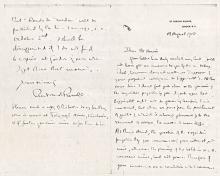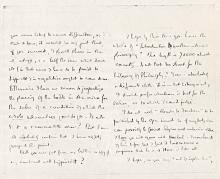BRACERS Record Detail for 47455
To access the original letter, email the Russell Archives.
The governor of Brixton's initials ("C.H.") are on the letter.
Letter 74
BR TO GEORGE ALLEN & UNWIN LTD. / STANLEY UNWIN, 19 AUG. 1918
BRACERS 47455. ALS. Reading
Previous Brixton letter, BRACERS 79640; next letter, BRACERS 18687
Edited by K. Blackwell, A. Bone, N. Griffin and S. Turcon
<letterhead>1
57 GORDON SQUARE,
LONDON, W.C.
<Brixton Prison>
19 August 1918.
Dear Mr Unwin
Your letter2 has duly reached me, but I coulda not have got an answer to you by 11 a.m. today. That, however, does not matter, as I approve of your proposed cablegram to Lippincott’s.3 At the same time I do not feel quite clear on the question of the royalties payable by you. I quite agree that Lippincott ought not to gain by breaking their contract, but when we pass from the punishment of guilt (which is always pleasant) to the reward of virtue, the matter is more difficult. As things stand, the question of the royalties payable by you concerns only your interest, not mine, whereas the placing of the book in U.S.A. concerns mine, but not yours. Therefore if your insistence on a condition which concerns you seems likely to cause difficulties, as I think it does, it would be only just that, if you succeed, I should share in the advantage, i.e. half the sum which does not (in that case) have to be paid to Lippincott’s in royalties ought to come to me. Otherwise I have no reason to jeopardize the placing of the book in America for the sake of a condition of which the whole advantage goes to you. Is not that a reasonable view? But I am not absolutely certain that I have rightly grasped the point.4
Did you ever get from my brother a copy of my contract with Lippincott?5
I hope by this time you have the whole of Introduction to mathematical philosophy.6 The length is 70000 almost exactly. Is not that too short for the Library of Philosophy? I am absolutely indifferent whether it is in that Library or not; I should prefer whatever is best for the sales, as to which I can’t judge.
I do not wish Roads to Freedom to be published by the Open Court Co.7 if anybody else can possibly be found. They are most unbusinesslike. I hope you will agree with Huebsch.8 I never heard of him before but I find it hard to resist a suspicion that he is a Hun. I hope not.
I hope, as you say “end of September”, that Roads to Freedom will be published by the time I emerge, i.e. October 2nd.9 I shall be disappointed if I do not find 6 copies at Gordon Square when I get there that morning.
Yours sincerely
Bertrand Russell.
Please send a copy of this letter to my brother, who is now at Telegraph House, Chichester, and if further questions arise refer them to him.
- 1
[document] The letter was edited from a photocopy of the signed original in BR’s hand in the Allen & Unwin archives at the University of Reading. The initials “CH” show that it was approved by the Brixton Governor.
- 2
Your letter Dated 16 August 1918 (BRACERS 50644).
- 3
cablegram to Lippincott’s Lippincott had refused to publish Roads to Freedom during the war because it discussed socialism, obviously in a favourable way. BR was anxious to secure another American publisher. B.W. Huebsch (see note 8 below), suggested by Lippincott, was acceptable to Unwin. The terms of the relationship were set out in his letter to Lippincott of 27 June 1918. At this time Unwin forecast UK publication optimistically as the end of September (actual publication was 1 December, as required by Unwin’s contract with Lippincott [BRACERS 50648]). BR himself had found Unwin as the UK publisher, and then used him to find an American replacement. Unwin therefore sought BR’s approval for this cryptic cable: “Assignment to Huebsch accepted terms Allen Unwin’s letter 27th June English publication end September”. Correspondence that ensued after BR’s release shows Lippincott declining Unwin’s proposal re Huebsch. BR sent a bitter letter (BRACERS 50648, drafted by Unwin) to Lippincott regarding the latter’s terms for an agreement with Huebsch. The letter reveals that Unwin did not have the right to publish Roads to Freedom before 1 December, if, apparently, Lippincott could not find another US publisher. This would account for the unexpected delay in Unwin’s publication of the book. In the end Henry Holt published it in the US in 1919.
- 4
grasped the point Unwin, in his reply of 20 August (BRACERS 50645), told BR he had overlooked the fact that Allen & Unwin were acting in this matter as his agents.
- 5
my contract with Lippincott Despite various efforts by Frank and suggestions by BR, the contract could not be located in the latter’s papers at Gordon Square. However, a typed carbon copy, with seals, is in the Russell Archives (BRACERS 70492) and is dated 11 October 1917. It does not seem to be a replacement copy.
- 6
Introduction to mathematical philosophy Written in Brixton and published in March 1919 by Allen & Unwin.
- 7
Open Court Co. An American publisher that published mainly philosophy, including The Monist, and that owed BR for the series “The Philosophy of Logical Atomism”.
- 8
Huebsch Unwin, on 16 August 1918 (BRACERS 50644), described this American publisher to BR: “B.W. Huebsch is quite well-known to us as a publisher of Socialistic and Progressive literature…. It is a small firm and I do not know how strong they are financially but they are fairly enterprising and are likely to do quite well with your book.” Huebsch never published a full book by BR, but in 1922 he did publish a hardbound edition of BR’s lecture, Free Thought and Official Propaganda (69 inPapers 15). Unwin, in his next letter (20 Aug. 1918, BRACERS 50645), allayed BR’s prudent concern that Huebsch (1876–1964) might be German by recollecting that he was a Jew. (He was born in the US.)
- 9
I hope … Roads to Freedom … published by the time I emerge, i.e. October 2nd Publication of the book was delayed until 1 December 1918. October 2nd was BR’s expected date of early release from Brixton. He was, in fact, let out earlier, on 14 September 1918.
Textual Notes
- a
I could A hole punched in the original letter for filing purposes left only “ould”, but the sense requires “I could”. Several other words were punched through, but enough remains of each one to obviate textual notes for them.


